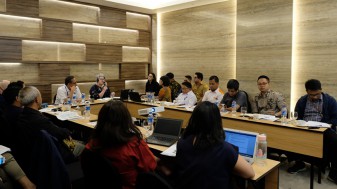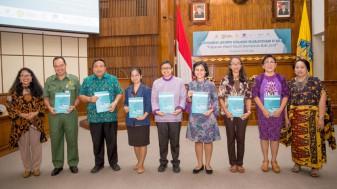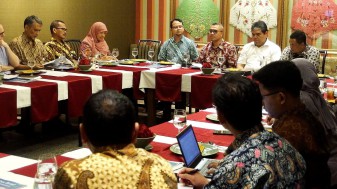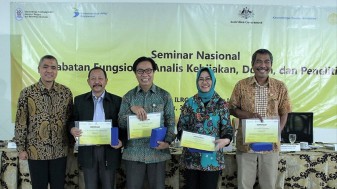The spread of the corona virus or COVID-19 in Indonesia has urged the government to take fast and effective measures to secure the economic stability in the country and help the most affected community groups mitigate the impact. For this reason, some regulations and guidelines have been issued to help align budget planning as well as conduct budget reallocation. According to the Secretary General of the Indonesian Forum National for Budget Transparency (FITRA), Misbah Hasan, efforts to synchronize and reallocate the budget for COVID-19 require transparency to ensure that policies will be aimed at the most appropriate target.
"Transparency is needed to stop fake news on frauds allegedly done by hospitals treating COVID-19 patients, or politicization of COVID-19 social assistance by candidates running for Regional Head Elections (Pilkada) and Village Head Elections (Pilkades)," said Secretary General of FITRA Misbah Hasan during an online KSIxChange # 25 discussion, titled 'Challenges of Budget Transparency and Synchronization of Fiscal Policies in Overcoming COVID-19 in Indonesia' on Thursday, July 23, 2020.
The Government of Indonesia has issued Presidential Regulation No.72/2020 to accelerate the spending of budget allocated for the pandemic and to support the implementation of the National Economic Recovery Program. The budget allocated for COVID-19 is Rp. 695 trillion, comprising of that allocated for health (Rp. 87.55 trillion), social protection (Rp. 203.9 trillion), business incentives (Rp. 120.61 trillion), Micro, Small and Medium Enterprises (Rp. 123, 46 trillion), corporate financing (Rp. 53.57 trillion), sectoral ministries / institutions and local governments (Rp. 106.11 trillion).
Misbah said when it came to budget allocation and spending, there were problems regarding transparency and accountability. The Budget Dashboard developed by the Ministry of Finance, for example, was not optimal in providing information related to Funding Sources and Distribution of Spending, including the Budget Utilization. Budget consolidation as mandated by article 6 of Minister of Finance Regulation 38/2020 had not been conducted either.
Other problems include the fact that COVID-19 Special Budget Dashboard was not yet available at the regional level, and that the community, as well as the research institutions experienced difficulty accessing this COVID-19 detailed budget information, both that from the central and regional governments. This certainly made supervision by Supervisory Agency (DPR / DPRD) or even community institutions difficult to carry out.
"The absorption of budget for COVID-19 is also still low," Misbah said.
To overcome these challenges, Misbah suggested that the government revitalize the budget management for COVID-19. Revitalization could be done by providing information related to budget sources, budget amounts, types of expenditure, targets for each expenditure in a transparent and easily accessible manner. Budget accountability should be done by providing a real-time basis update, regular reporting to regulatory bodies, and providing the community with opportunities to audit and monitor.
The Team Leader of Community Collaboration and Services for Welfare (KOMPAK), Anna Winoto, said that accountability and transparency in managing the budget should also be carried out by the regional governments because they also received transfer for COVID-19 from the central government. The problem was, in terms of the capacity and ability to manage finances, there local governments varied a lot from one another. Another challenge was that the local governments, when they reported and showed accountability for the use of the budget, this was only done for the interest of the central government.
"The local governments are also accountable to the community, and this is often overlooked, therefore the space for community participation in budget allocation decisions in the region is barely available," said Anna.
Anna said that public participation in budget allocation decisions in local governments was paramount to ensure that all COVID-19 related programs were well-targeted and appropriate. For this reason, the government and NGOs were expected to facilitate the voices of the public and engage them in the making of decisions that were related to budgeting as well as providing them with a complaint handling mechanism.
An Expert Staff on State Expenditure for the Ministry of Finance, Kunta Wibawa Dasa Nugraha, welcomed the input from the National Secretariat The Finance Ministry's FITRA and KOMPAK. Kunta said the government had been trying to promote budget transparency by inviting the public to participate in monitoring and giving feedback to improve policies.
"We (the Government of Indonesia) want to be flexible and fast while continuously holding up to the principles of good governance," said Kunta.
The Head of the Center for State Budget Revenue Policy of the Fiscal Policy Agency, Ministry of Finance, Ubaidi Socheh Hamidi, said COVID-19 budget had been discussed inter-ministerial / institutional coordination meetings. Decisions of these meetings were often shared to the media and always communicated with the House of Representatives. To maintain accountability, Ubaidi said that they also consulted with the law enforcers and auditors to avoid improper utilization of budget.
"The government is concerned with transparency because we perceive it as obligation and responsibility," Ubaidi said.
Regarding the need to do refocusing of COVID-19 budget at ministries/agencies and local governments, Ubaidi said that his office was coordinating with the Ministry of Home Affairs to disseminate information on this issue. This cooperation aimed to accelerate the implementation of the central government policy by the regional governments.
The Deputy for Monitoring, Evaluation and Control of Development of the National Development Planning Agency (Bappenas), Taufik Hanafi, said that transparency and accountability in handling COVID-19 had been carried out since the policy planning stage. Taufik said public consultation was carried out before planning. Bappenas also conveyed the results of the development evaluation on a regular basis to the public. He said public participation was needed because the handling of COVID-19 could not only be solely done by the government.
"It is very important to engage social institutions such as FITRA, KOMPAK Program, and others because they have instruments that can reach out to deeper levels of the society, up to the village level," said Taufik.
The KSIxChange#25 online discussion was organized by Knowledge Sector Initiative, in collaboration with the National Secretariat of FITRA and Open Government Indonesia (OGI). The discussions which involved Bappenas, the Ministry of Finance, and KOMPAK Program laid out an overview of the challenges faced by the government in promoting transparency and synchronizing fiscal policies in effort to address COVID-19 in Indonesia. But at the same time, they also pointed out that the public and policy research institutions could contribute to the policy-making to promote budget transparency and to ensure the synchronization of these policies to effectively address COVID-19 in Indonesia. **





